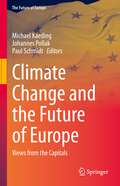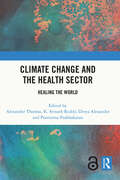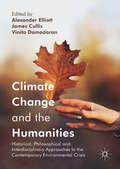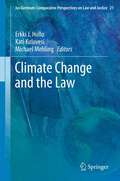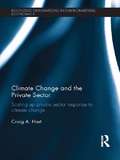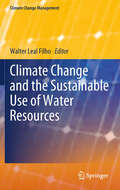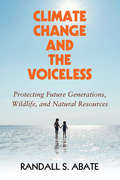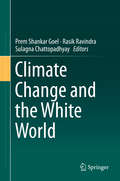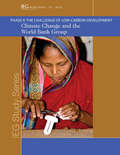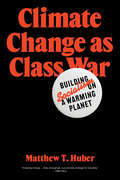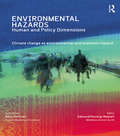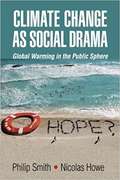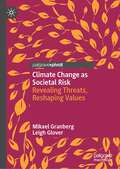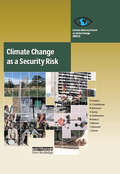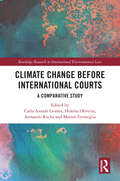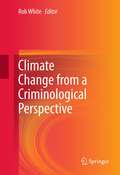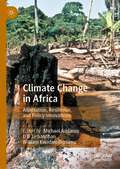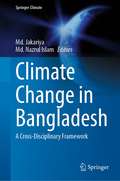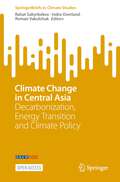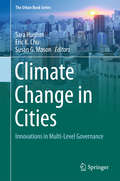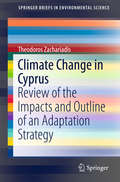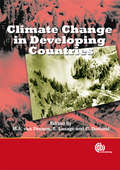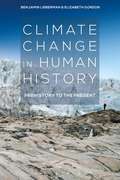- Table View
- List View
Climate Change and the Future of Europe: Views from the Capitals (The Future of Europe)
by Michael Kaeding Paul Schmidt Johannes PollakWhile the ambitious objectives outlined in the EU’s Green Deal aim at making Europe the first climate-neutral continent by 2050, national implementation greatly varies depending on local geographies, history, culture, economics, and politics. This book analyses Member States’ and EU neighbours’ national efforts to combat climate change. It subsequently draws on these factors to highlight local challenges, tensions, and opportunities on the road towards climate neutrality. In the context of inter-country dependencies following Russia’s war against Ukraine, it addresses strategic questions regarding EU integration, the transformation of our economies, the reduction of energy dependencies, and public perception of the above. The book also makes concrete recommendations, in various policy areas, on how individual countries and the EU as a whole should deal with the climate crisis.
Climate Change and the Health Sector: Healing the World
by Alexander Thomas K. Srinath Reddy Divya Alexander Poornima PrabhakaranThe health sector is known to be one of the major contributors towards the greenhouse gas emissions causing the climate crisis, the greatest health threat of the 21st century. This volume positions the health sector as a leader in the fight against climate change and explores the role of the health system in climate policy action. It delivers an overview of the linkages between climate change and the health sector, with chapters on the impact of climate change on health, its connection to pandemics, and its effects on food, nutrition and air quality, while examining gendered and other vulnerabilities. It delves into the different operational aspects of the health sector in India and details how each one can become climate-smart to reduce the health sector’s overall carbon footprint, by looking at sustainable procurement, green and resilient healthcare infrastructure, and the management of transportation, energy, water, waste, chemicals, pharmaceuticals and plastics in healthcare. Well supplemented with rigorous case studies, the book will be indispensable for students, teachers, and researchers of environmental studies, health sciences, and climate change. It will be useful for healthcare workers, public health officials, healthcare leaders, policy planners, and those interested in climate resilience and preparedness in the healthcare sector.
Climate Change and the Humanities: Historical, Philosophical and Interdisciplinary Approaches to the Contemporary Environmental Crisis
by Vinita Damodaran Alexander Elliott James CullisThis volume of essays fills a lacunae in the current climate change debate by bringing new perspectives on the role of humanities scholars within this debate. The humanities have historically played an important role in the various debates on environment, climate and society. The past two decades especially have seen a resurfacing of these environmental concerns across humanities disciplines in the wake of what has been termed climate change. This book argues that these disciplines should be more confident and vocal in responding to climate change while questioning the way in which the climate change debate is currently being conducted in academic, political and social arenas. Addressing climate change through the varied approaches of the humanities means re-thinking and re-evaluating its fundamental assumptions and responses to perceived crisis through the lens of history, philosophy and literature. The volume aims thus to be a catalyst for emerging scholarship in this field and to appeal to an academic and popular readership.
Climate Change and the Law (Ius Gentium: Comparative Perspectives on Law and Justice #21)
by Michael Mehling Kati Kulovesi Erkki J. HolloClimate Change and the Law is the first scholarly effort to systematically address doctrinal issues related to climate law as an emergent legal discipline. It assembles some of the most recognized experts in the field to identify relevant trends and common themes from a variety of geographic and professional perspectives. In a remarkably short time span, climate change has become deeply embedded in important areas of the law. As a global challenge calling for collective action, climate change has elicited substantial rulemaking at the international plane, percolating through the broader legal system to the regional, national and local levels. More than other areas of law, the normative and practical framework dedicated to climate change has embraced new instruments and softened traditional boundaries between formal and informal, public and private, substantive and procedural; so ubiquitous is the reach of relevant rules nowadays that scholars routinely devote attention to the intersection of climate change and more established fields of legal study, such as international trade law. Climate Change and the Law explores the rich diversity of international, regional, national, sub-national and transnational legal responses to climate change. Is climate law emerging as a new legal discipline? If so, what shared objectives and concepts define it? How does climate law relate to other areas of law? Such questions lie at the heart of this new book, whose thirty chapters cover doctrinal questions as well as a range of thematic and regional case studies. As Christiana Figueres, Executive Secretary of the United Nations Framework Convention on Climate Change (UNFCCC), states in her preface, these chapters collectively provide a "review of the emergence of a new discipline, its core principles and legal techniques, and its relationship and potential interaction with other disciplines."
Climate Change and the Private Sector: Scaling Up Private Sector Response to Climate Change (Routledge Explorations in Environmental Economics #40)
by Craig A. HartClimate Change and the Private Sector explores the challenges of transforming our energy infrastructure to become carbon neutral and adapting to climate change in the twenty-first century. It examines the critical role that the private sector must play in these challenges. To transform the global energy complex to be carbon neutral within a time frame designed to prevent irreparable damage to the environment presents unprecedented challenges. The private sector must deploy financial, material, and engineering resources on a scale never before undertaken — with government providing leadership, removing barriers and supporting industry efforts through policies that mobilize markets to achieve environmental objectives. A key element of supporting private sector initiative to address climate change is policies that help form and sustain markets that supply, finance and generate demand for the technologies necessary to transform our energy infrastructure. The characteristics and examples of these policies are explored in detail. Companies that respond to these challenges both by mitigating greenhouse gases and adapting to climate change will enhance their own competitiveness and contribute to society in the process. Companies that embrace the challenge to decarbonize their manufacturing operations, whether in response to regulation (or the threat of regulation) or market opportunities, invariably discover ways to improve their operations in the process that could potentially enhance their ability to produce better products, more efficiently. The book explores examples of companies that have redesigned their products and manufacturing processes, and in doing so transformed themselves and reshaped their industries. As in the case of companies mitigating greenhouse gas emissions, companies that lead their industries in adapting their own operations to a changing physical environment are more likely to ensure their resilience in a changing business environment. This book provides business, policy and academic audiences with an in-depth exploration of the subject, and a practical guide to action.
Climate Change and the Sustainable Use of Water Resources (Climate Change Management)
by Walter Leal FilhoThe book explores the geo-chemical, physical, social and economic impacts of climate change on water supplies. It contains examples and case studies from a wide range of countries, and addresses the need to promote sustainable water use across the world.
Climate Change and the Voiceless: Protecting Future Generations, Wildlife, and Natural Resources
by Randall S. AbateFuture generations, wildlife, and natural resources - collectively referred to as 'the voiceless' in this work - are the most vulnerable and least equipped populations to protect themselves from the impacts of global climate change. While domestic and international law protections are beginning to recognize rights and responsibilities that apply to the voiceless community, these legal developments have yet to be pursued in a collective manner and have not been considered together in the context of climate change and climate justice. In Climate Change and the Voiceless, Randall S. Abate identifies the common vulnerabilities of the voiceless in the Anthropocene era and demonstrates how the law, by incorporating principles of sustainable development, can evolve to protect their interests more effectively. This work should be read by anyone interested in how the law can be employed to mitigate the effects of climate change on those who stand to lose the most.
Climate Change and the White World
by Rasik Ravindra Prem Shankar Goel Sulagna ChattopadhyayThis book showcases the results of studies pertaining to climate changes in the Polar Regions - Arctic-Antarctic-Himalaya. It discusses the significant variations due to thinning of sea ice in the Arctic, insights on the first Indian Arctic multi-sensor mooring (IndARC), political context of major geological and tectonic features of Arctic Ocean, climate change and its predicted impacts on fisheries and coastal communities. The book also contains the work pursued under the National Mission for Sustaining the Himalayan Ecosystems, aiming towards strengthening the capacities of farmers through appropriate Lab-to-Land intervention to combat climate change issues. Discussions on various models like WRF (Weather Research and Forecasting), Regional Climate Model (RegCM4) pertaining to Himalaya have been highlighted to gain more insights on climate change.
Climate Change and the World Bank Group
by The World BankThis study from the Independent Evaluation Group draws lessons for development and climate change mitigation from the World Bank Group's far-reaching portfolio of projects in energy, forestry, transport, coal power, and technology transfer. Reviewing what has worked, what hasn't, and why, the evaluation's key findings include: Energy efficiency can offer countries direct economic returns that dwarf those of most other development projects, while also reducing greenhouse gas emissions. Tropical forest protected areas, on average, significantly reduce tropical deforestation, preserving carbon and biodiversity. Deforestation rates are lower in areas that allowed sustainable use by local populations than in strictly protected areas. Deforestation rates were lowest of all in indigenous forest areas. For renewable energy projects, long-duration loans have been important in making projects financially viable.. But at prevailing carbon prices, carbon offset sales had little impact on most renewable energy projects' rate of returns, and did not address investors' need for up-front capital. Technology transfer - broadly understood to include diffusion of technical and financial innovations related to low-carbon development - has worked well when the logic of piloting and demonstration is well thought out, and when grants are used to mitigate the risk of pioneering efforts.
Climate Change as Class War: Building Socialism on a Warming Planet
by Matthew T. HuberHow to build a movement to confront climate changeThe climate crisis is not primarily a problem of &‘believing science&’ or individual &‘carbon footprints&’ – it is a class problem rooted in who owns, controls and profits from material production. As such, it will take a class struggle to solve. In this ground breaking class analysis, Matthew T. Huber argues that the carbon-intensive capitalist class must be confronted for producing climate change. Yet, the narrow and unpopular roots of climate politics in the professional class is not capable of building a movement up to this challenge. For an alternative strategy, he proposes climate politics that appeals to the vast majority of society: the working class. Huber evaluates the Green New Deal as a first attempt to channel working class material and ecological interests and advocates building union power in the very energy system we need to dramatically transform. In the end, as in classical socialist movements of the early 20th Century, winning the climate struggle will need to be internationalist based on a form of planetary working class solidarity.
Climate Change as Environmental and Economic Hazard (Environmental Hazards Series)
by Boris PorfirievThe current policy for climate change prioritises mitigation over adaptation. The collected papers of Climate Change as Environmental and Economic Hazard argue that although efforts to reduce greenhouse gas emissions are still vital, the new policy paradigm should shift the priority to adaptation, with a special focus on disaster risk reduction. It should also consider climate change not purely as a hazard and a challenge, but as a window of opportunity to shift to a new sustainable development policy model, which stresses the particular importance of communities' resilience. The papers in this volume explore the key issues linked to this shift, including: ' Increasing research into the Earth Sciences, climate reconstruction and forecasting in order to decrease the degree of uncertainty about the origin, development and implications of climate change; ' The introduction of more binding and comprehensive regulation of both greenhouse gas emissions and adaptation measures, like that in the United Kingdom; ' Matching climate policy with that for disasters and mainstreaming it into overall development strategies. The volume is a valuable addition to previous climate change research and considers a new policy approach to this new global challenge.
Climate Change as Social Drama
by Philip Smith Nicolas Howe Smith, Philip and Howe, NicolasClimate change is not just a scientific fact, nor merely a social and political problem. It is also a set of stories and characters that amount to a social drama. This drama, as much as hard scientific or political realities, shapes perception of the problem. Drs Smith and Howe use the perspective of cultural sociology and Aristotle's timeless theories about narrative and rhetoric to explore this meaningful and visible surface of climate change in the public sphere. Whereas most research wants to explain barriers to awareness, here we switch the agenda to look at the moments when global warming actually gets attention. Chapters consider struggles over apocalyptic scenarios, explain the success of Al Gore and An Inconvenient Truth, unpack the deeper social meanings of the climate conference and 'Climategate', critique failed advertising campaigns and climate art, and question the much touted transformative potential of natural disasters such as Superstorm Sandy.
Climate Change as Societal Risk: Revealing Threats, Reshaping Values
by Mikael Granberg Leigh GloverThis book analyzes climate change from a societal risk perspective, considering IPCC data, harm reduction, and global impact. Climate change is a globalised agent of social disruption whose impacts will worsen societal inequities and inequalities around the world. For some unfortunate societies already precariously exposed, climate change will tip them into societal collapse. Devastation will also occur to many ecological values in which all societies are embedded. But effective social action can limit the extent of these costs and losses. Ultimately, only social transformation can limit the social and environmental harms of climate change. But what does this mean? To what extent is society at risk? Are such risks particularized and restricted to specific segments and localities? Or is society at risk in a more universal way? Climate risks are re-shaping the practices of households, communities, governments and businesses. In this way, climate risks are a dynamic element in social change and social processes. Risk holds a mirror to society, revealing who and what is prioritized, recognized and valued. It also provides a reckoning of our perceived strengths, vulnerabilities and weaknesses. This volume examines how we understand the societal risks of contemporary and forecast climate change impacts—and those risks inherent in dealing with these impacts. We know that society is fashioning a new global climate—but climate change is also re-fashioning society; this book explores this dynamic process and considers its implications for future society.
Climate Change as a Security Risk
by Hans Joachim SchellnhuberWithout resolute counteraction, climate change will overstretch many societies' adaptive capacities within the coming decades. This could result in destabilization and violence, jeopardizing national and international security to a new degree. However, climate change could also unite the international community. This is provided that we recognize climate change as a threat to humankind and so set the course for adopting a dynamic and globally coordinated climate policy. If we fail to do so, climate change will draw ever-deeper lines of division and conflict in international relations, triggering numerous conflicts between and within countries over the distribution of resources - especially water and land, and over the management of migration, or over compensation payments between the countries mainly responsible for climate change and those countries most affected by its destructive effects. With Climate Change as a Security Risk, WBGU has compiled a flagship report on an issue that quite rightly is rising rapidly up the international political agenda. The authors pull no punches on the likelihood of increasing tensions and conflicts in a climatically constrained world and spotlight places where possible conflicts may flare up in the 21st century unless climate change is checked. The report makes it clear that climate policy is preventative security policy.
Climate Change before International Courts: A Comparative Study (Routledge Research in International Environmental Law)
by Carla Amado Gomes, Heloísa Oliveira, Armando Rocha and Matteo FermegliaThis book provides a comprehensive analysis of environmental law and climate change litigation within international courts, both substantively and procedurally. Climate change litigation is an area of continuous growth and complexity, particularly within international courts and bodies. This book uses a comparative approach, analysing case law from international sources. It focuses on three key areas, namely trends and features, legal grounds for litigation, and legal standing before courts. A concluding comparative chapter highlights the specific shortcomings and potential of each system in dealing with climate change problems, taking stock of fragmentation and unity in international law. The book presents instances in which international courts are applying procedural and substantive law to this disruptive, transnational, and intergenerational legal problem. It addresses gaps in the legal framework and identifies systems which are not fit for purpose.With international contributions from authors of diverse backgrounds, this book will be of interest to researchers in the field of climate change and environmental law, EU and international law, and international court litigation.
Climate Change from a Criminological Perspective
by Rob WhiteFew would dispute the power of climate change to lead to profoundly destructive weather events. At the same time, the possibility of climate change as a consequence--or even a cause--of criminal events is far less recognized. As the earth grows warmer, issues regarding land use, water rights, bio-security, and food production and distribution will continue to have far-reaching impact, and produce more opportunity for offenses by individuals and groups as well as political and corporate entities. In Climate Change from a Criminological Perspective, a panel of pioneering green criminologists investigates an increasingly complex chain of ecological causes and effects. Illegal acts are analyzed as they contribute to environmental decline (e.g., wildlife poaching) or result from ecological distress (e.g., survival-related theft). Regulatory and other interventions are critiqued, concepts of environmental harm refined, and new research methodologies called for. And while individual events described are mainly local, the contributors keep the global picture, and substantial questions about human rights and social relationships, firmly in mind. Topics featured include: Global warming as corporate crime. Climate change and the courts: U.S. and global views. Climate change, natural disasters, and gender inequality. The roles and responsibilities of environmental enforcement networks. A sociocultural perspective on climate change denial. PLUS: instructive in-depth chapters on criminological aspects of Hurricane Katrina and the Japanese nuclear disaster. A volume of considerable timeliness and vision, Climate Change from a Criminological Perspective will be read and discussed, and will inspire action, by researchers in criminology, criminal justice, environmental studies, and related disciplines, as well as policymakers.
Climate Change from the Streets: How Conflict and Collaboration Strengthen the Environmental Justice Movement
by Michael MendezAn urgent and timely story of the contentious politics of incorporating environmental justice into global climate change policy Although the science of climate change is clear, policy decisions about how to respond to its effects remain contentious. Even when such decisions claim to be guided by objective knowledge, they are made and implemented through political institutions and relationships—and all the competing interests and power struggles that this implies. Michael Méndez tells a timely story of people, place, and power in the context of climate change and inequality. He explores the perspectives and influence low‑income people of color bring to their advocacy work on climate change. In California, activist groups have galvanized behind issues such as air pollution, poverty alleviation, and green jobs to advance equitable climate solutions at the local, state, and global levels. Arguing that environmental protection and improving public health are inextricably linked, Mendez contends that we must incorporate local knowledge, culture, and history into policymaking to fully address the global complexities of climate change and the real threats facing our local communities.
Climate Change in Africa: Adaptation, Resilience, and Policy Innovations
by Michael Addaney D B Jarbandhan William Kwadwo DumenuThis edited collection chronicles the public policy responses to climate change and current and potential impacts that will affect critical and priority sectors within and across African countries now and in the coming decades. Contributions cover governance and policy responses to climate change, emphasizing continental governance and policy responses, national governance and policy responses (what selected countries in Africa are doing), and local or community policy and programmatic responses (what some selected major African communities are doing). Each chapter adopts multi-disciplinary and transdisciplinary approaches, combining insights from social and policy sciences, emphasizing existing gaps, particularly in the area of decision-making, governance and local climate action. The book offers both theoretical and practical contributions, with the aim of advancing academic discourse and thinking, policymaking and implementation of climate interventions in Africa.
Climate Change in Bangladesh: A Cross-Disciplinary Framework (Springer Climate)
by Md. Nazrul Islam Md. JakariyaThis book is a comprehensive resource for climate change impacts and scenarios on cross-cutting issues in Bangladesh and other tropical low-lying countries in Asia. The book promotes mitigation and adaptation strategies for learning and innovation to tackle climate change impacts, reduce inequality, as well as include changes in food, energy, health, education, and social protection policies in Bangladesh and Asian low-lying countries.Through several case studies, this book provides a powerful framework for identifying management tools and their applications in environment and governance including; climate change and natural hazards, climate change and energy framework, gender inequality and capacity building, and community participants and the actions needed to protect them.The aim of this book is to provide information to scientists, practitioners, academics, and government and non-government policy-makers to help them better understand the particularities of climate change adaptation and mitigation strategies for cross-cutting issues in Bangladesh.
Climate Change in Central Asia: Decarbonization, Energy Transition and Climate Policy (SpringerBriefs in Climate Studies)
by Indra Overland Rahat Sabyrbekov Roman VakulchukThis open access book explores climate change impacts, adaptation, and mitigation in Central Asia and discusses policy options for the Central Asian governments. To address the urgent need for local scholarship on climate change in Central Asia, and in particular the need for more research by social scientists, this book features a wide range of contributions on climate change impacts, adaptation and mitigation in the region. Each chapter makes an important contribution to social science scholarship on climate change and decarbonization in Central Asia. Topics include decarbonization opportunities, carbon pricing instruments, the geo-economics of the energy transition, the relationship between human mobility and climate change. The book thus offers valuable insights for both academics and policymakers.
Climate Change in Cities: Innovations in Multi-Level Governance (The Urban Book Series)
by Sara Hughes Eric K. Chu Susan G. MasonThis book presents pioneering work on a range of innovative practices, experiments, and ideas that are becoming an integral part of urban climate change governance in the 21st century. Theoretically, the book builds on nearly two decades of scholarships identifying the emergence of new urban actors, spaces and political dynamics in response to climate change priorities. However, it further articulates and applies the concepts associated with urban climate change governance by bridging formerly disparate disciplines and approaches. Empirically, the chapters investigate new multi-level urban governance arrangements from around the world, and leverage the insights they provide for both theory and practice. Cities - both as political and material entities - are increasingly playing a critical role in shaping the trajectory and impacts of climate change action. However, their policy, planning, and governance responses to climate change are fraught with tension a nd contradictions. While on one hand local actors play a central role in designing institutions, infrastructures, and behaviors that drive decarbonization and adaptation to changing climatic conditions, their options and incentives are inextricably enmeshed within broader political and economic processes. Resolving these tensions and contradictions is likely to require innovative and multi-level approaches to governing climate change in the city: new interactions, new political actors, new ways of coordinating and mobilizing resources, and new frameworks and technical capacities for decision making. We focus explicitly on those innovations that produce new relationships between levels of government, between government and citizens, and among governments, the private sector, and transnational and civil society actors. A more comprehensive understanding is needed of the innovative approaches being used to navigate the complex networks and relationships that constitute contemporary multi-level urban climate change governance. Debra Roberts, Co-Chair, Working Group II, IPCC 6th Assessment Report (AR6) and Acting Head, Sustainable and Resilient City Initiatives, Durban, South Africa "Climate Change in Cities offers a refreshingly frank view of how complex cities and city processes really are. " Christopher Gore, Associate Professor and Chair, Department of Politics and Public Administration, Ryerson University, Canada "This book is a rare and welcome contribution engaging critically with questions about cities as central actors in multilevel climate governance but it does so recognizing that there are lessons from cities in both the Global North and South. " Harriet Bulkeley, Professor of Geography, Durham University, United Kingdom "This timely collection provides new insights into how cities can put their rhetoric into action on the ground and explores just how this promise can be realised in cities across the world - from California to Canada, India to Indonesia. "
Climate Change in Cyprus: Review of the Impacts and Outline of an Adaptation Strategy (SpringerBriefs in Environmental Science)
by Theodoros ZachariadisThis book providesa concise overview of facts and projections aboutclimate change in Cyprus and its region until the end of the 21st century. Climate change is expected to have adverse effects in Mediterranean Europe - the most serious compared to other European regions. Being an island state with a semi-arid climate in the Eastern Mediterranean, Cyprus is located in a hot spot. Basedon the information available in the literature, it highlights the expected natural, economic and societal impacts ofclimate change and presents recommendations forthe implementation of a nationaladaptation strategy. Despite the dismal outlook arising from this review,the book demonstrates that coping with climate change is possible, provided thatproactive actions are taken by both the public and the private sector. Publicauthorities need to set clear priorities and set up adequate monitoringmechanisms that can help avoid large natural and economic damages at a laterstage. Enabling private adaptation investments and properly pricing the use ofnatural resources are key priorities for investing in a climate resilienteconomy.
Climate Change in Deserts
by Martin WilliamsThis book reconstructs climatic changes in deserts and their margins at a variety of scales in space and time. It draws upon evidence from land and sea, including desert dunes, wind-blown dust, river and lake sediments, glacial moraines, plant and animal fossils, isotope geochemistry, speleothems, soils, and prehistoric archaeology. The book summarises the Cenozoic evolution of the major deserts of the Americas, Eurasia, Africa and Australia and the causes of historic floods and droughts. The book then considers the causes and consequences of desertification and proposes four key conditions for achieving ecologically sustainable use of natural resources in arid and semi-arid areas. Climate Change in Deserts is an invaluable reference for researchers and advanced students interested in the climate and geomorphology of deserts: geographers, geologists, ecologists, archaeologists, soil scientists, hydrologists, climatologists and natural resource managers.
Climate Change in Developing Countries: Results from the Netherlands Climate Change Studies Assistance Programme
by R. Lasage C. Dorlands M. A. van DrunenThis book presents an overview of the studies conducted by the Netherlands Climate Change Studies Assistance program. The program was set up in recognition of the need for developing countries, in particular, to face the challenges confronting all countries under the UN Framework Convention on Climate Change. The book presents an overview of the main results in 13 countries: Bolivia, Colombia, Ecuador, Egypt, Ghana, Kazakhstan, Mali, Mongolia, Senegal, Suriname, Vietnam, Yemen and Zimbabwe. It provides a critical evaluation of the methodologies and approaches used, a cross-country synthesis and recommendations for further studies. Subjects dealt with include not only impact studies, but also vulnerability and adaptation, mitigation and climate related policy.
Climate Change in Human History: Prehistory to the Present
by Elizabeth Gordon Benjamin LiebermanClimate Change and Human History provides an up-to-date and concise introduction to the relationship between human beings and climate change throughout history. <P><P>Starting with periods hundreds of thousands of years ago and continuing up to the present day, the book illustrates how natural climate variability affected early human societies, and how humans are now altering climate drastically within much shorter periods of time. For each major period of time, the book will explain how climate change has created opportunities as well as risks and challenges for human societies. <P><P>The book introduces and develops several related themes including: <ul> <li>Phases of climate and history</li> <li>Factors that shape climate</li> <li>Climate shocks and sharp climate shifts</li> <li>Climate and the rise and fall of civilizations</li> <li>Industrialization and climate science</li> <li>Accelerating climate change, human societies, and the future</li> </ul> <P><P>An ideal companion for all students of environmental history, Climate Change and Human History clearly demonstrates the critical role of climate in shaping human history and of the experience of humans in both adapting to and shaping climate change.
